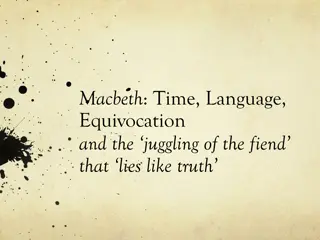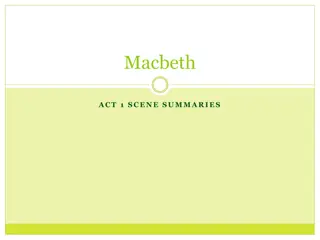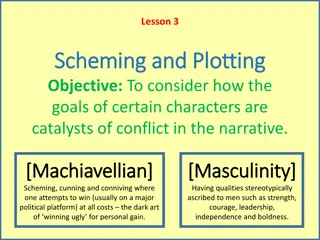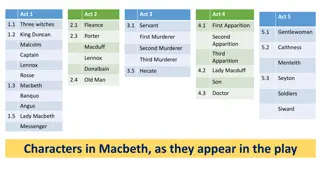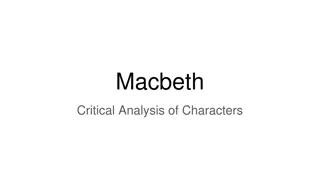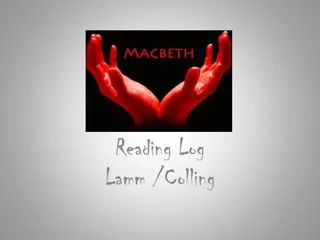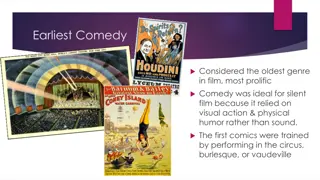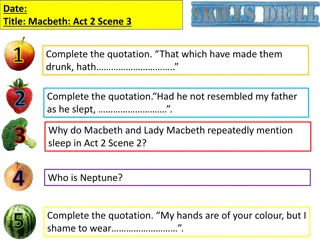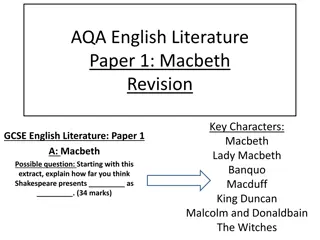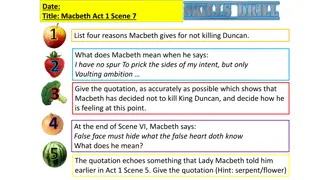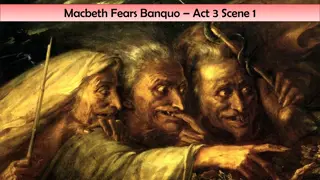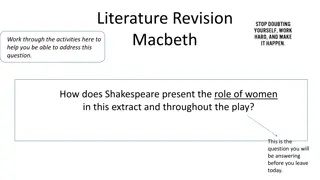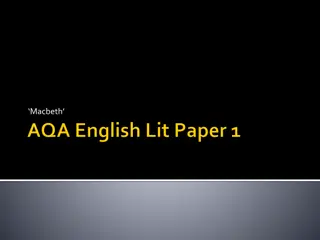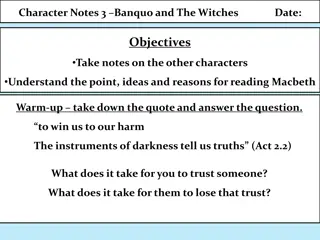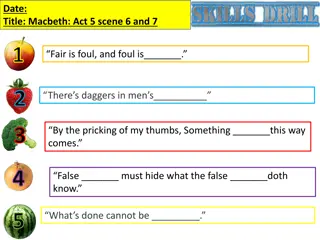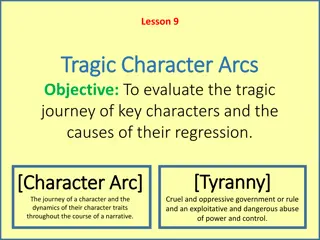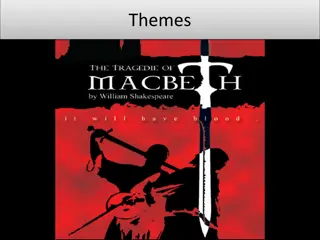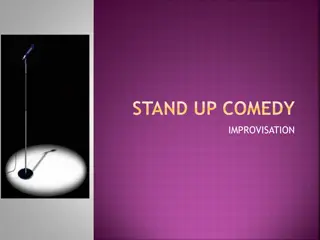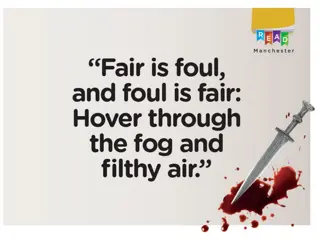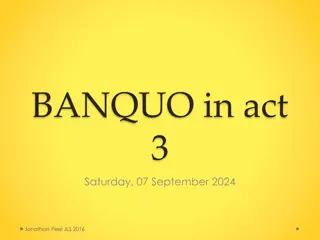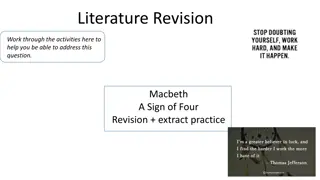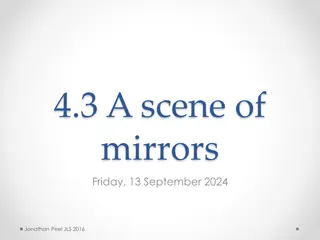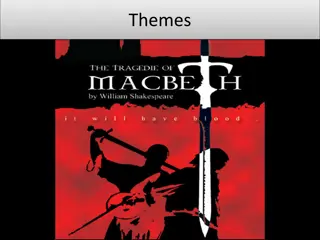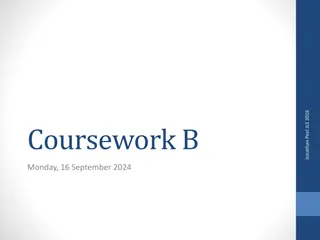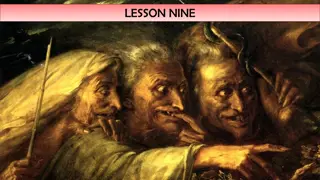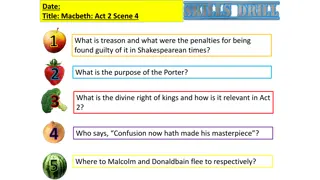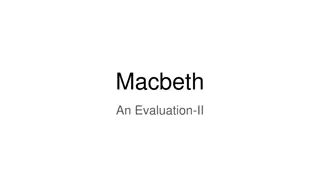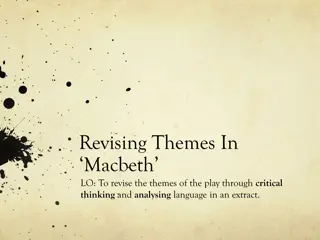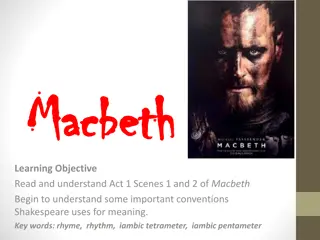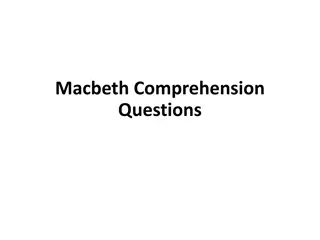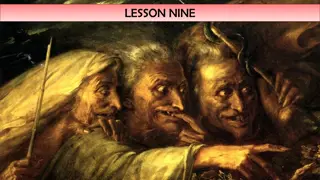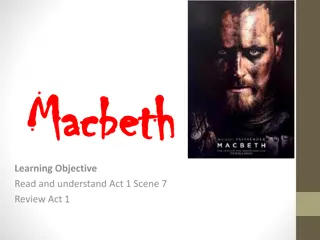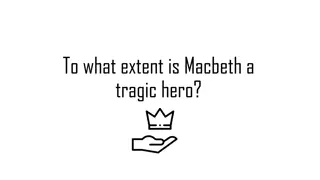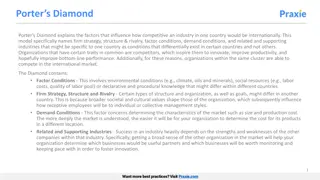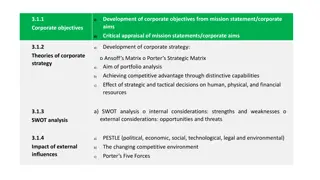Macbeth: The Porter, Equivocation, and Stand-up Comedy
Exploring the themes of equivocation and comedy in Shakespeare's Macbeth, this content covers the significance of the Porter scene, historical context related to Guy Fawkes and equivocation, and how comedy is intertwined with serious themes in the play. Equivocation, lying under oath, and Catholic absolution are discussed alongside how these elements are reflected in the play's structure and characters. The parallels drawn between historical events and the play shed light on the complexity and depth of Macbeth's themes.
Download Presentation

Please find below an Image/Link to download the presentation.
The content on the website is provided AS IS for your information and personal use only. It may not be sold, licensed, or shared on other websites without obtaining consent from the author. Download presentation by click this link. If you encounter any issues during the download, it is possible that the publisher has removed the file from their server.
E N D
Presentation Transcript
Macbeth 2.3: The Porter and Equivocation Saturday, 14 September 2024
5 A Day recap: Fill in the missing words as required 1: Fair is foul and .. (witches) 2: This supernatural soliciting / cannot be ill, (Macbeth) 3: It is too full of .. (Lady) 4: Look like th innocent flower, / but (Lady) 5: My hands are of your colour, but I shame / to wear a heart . (Lady)
5 A Day recap: Fill in the missing words as required 1: Fair is foul and FOUL IS FAIR .. (witches) 2: This supernatural soliciting / cannot be ill, CAN NOT BE GOOD (Macbeth) 3: It is too full of THE MILK OF HUMAN KINDNESS .. (Lady) 4: Look like th innocent flower, / but BE THE SERPENT UNDER IT (Lady) 5: My hands are of your colour, but I shame / to wear a heart SO WHITE . (Lady)
2.3: Stand up comedian and serious message Background info GUY FAWKES plotters put on trial on 27thJanuary 1606. Plotters helped by a Priest: Henry Garnet, who heard confession from all and forgave them for EQUIVOCATION (Lying while under oath) Also known as Farmer Garnet He was put to trial in March 1606 Macbeth first known performance: August 1606 Relevance of this scene becomes clearer.
In the play (Structure): Knocking links the scene directly to 2.2 Acts as a diversion which builds tension. We want to know who has arrived and whether the Macbeths will get away with Regicide. Introduces the discovery of the bodies.
Equivocation Lying plausibly or seeking to deceive by lying. Lying was believed to be a sin. To lie under oath was Blasphemy. At the time of the trial, the Pope granted Catholics absolution for lying under oath in this case. Garnet heard confession from all and continued to lie under oath. He was executed for not giving away secrets rather than for his role in the plot. Equivocation was a word on the lips of all the idea that these possible murderers could escape justice was terrible especially as the Catholic church supported it.
Stand-up time Just as today, comedians use the current affairs to maker their acts topical In this scene, Shakespeare s clown is given the chance to do the same riffing on Catholics, Equivocation and attempted Regicide. We will look at the speech and find instances of this humour within.
Here's a knocking indeed! If a man were porter of hell-gate, he should have old turning the key. Knocking within Knock, knock, knock! Who's there, i' the name of Beelzebub? Here's a farmer, that hanged himself on the expectation of plenty: come in time; have napkins enow about you; here you'll sweat for't. Knocking within Reference to Farmer Garnet
Knock, knock! Who's there, in the other devil's name? Faith, here's an equivocator, that could swear in both the scales against either scale; who committed treason enough for God's sake, yet could not equivocate to heaven: O, come in, equivocator. Knocking within Knock, knock, knock! Who's there? Faith, here's an English tailor come hither, for stealing out of a French hose: come in, tailor; here you may roast your goose. Knocking within Knock, knock; never at quiet! What are you? But this place is too cold for hell. I'll devil-porter it no further: I had thought to have let in some of all professions that go the primrose way to the everlasting bonfire. Knocking within Anon, anon! I pray you, remember the porter. Opens the gate If he could not equivocate to Heaven, where must we be? The Primrose Way the easy route. Heaven is reached by a harder and difficult route. The Bonfire is Hell and also the typical punishment for non- believers burning at the stake He tells us his role. Audience know this as the porter of Hell s gate
Porter 'Faith sir, we were carousing till the second cock: and drink, sir, is a great provoker of three things. MACDUFF What three things does drink especially provoke? Porter Marry, sir, nose-painting, sleep, and urine. Lechery, sir, it provokes, and unprovokes; it provokes the desire, but it takes away the performance: therefore, much drink may be said to be an equivocator with lechery: it makes him, and it mars him; it sets him on, and it takes him off; it persuades him, and disheartens him; makes him stand to, and not stand to; in conclusion, equivocates him in a sleep, and, giving him the lie, leaves him. MACDUFF I believe drink gave thee the lie last night. Porter That it did, sir, i' the very throat on me: but I requited him for his lie; and, I think, being too strong for him, though he took up my legs sometime, yet I made a shift to cast him. Sets up a series of sexual innuendo to illustrate Equivocation. Low humour to entertain Develops the joke with opportunity for visual sight gags
Contexts Audience familiar with Mystery Plays touring religious plays in which the Porter of Hell s gate is a key character. Audience have anger and resentment against Catholics, especially since Gunpowder Plot. This emerges in a negative response to Equivocation The King s Men included a Clown in the company. This is a chance for him to deliver a topical set piece. The play did not get written down in this form until 1623. Hard to know what was actually said in each performance possibly adjusted to suit the audience and news of the day.
Effect The Porter opens Macbeth s Castle Gate. He is the Porter of Hell s gate. Metaphorically, the castle is now Hell and the King of that castle (Macbeth) can therefore be seen as?
Links https://www.youtube.com/watch?v=cQKdyaJHglM https://jwpblog.com/2015/10/21/on-equivocation-macbeth-in- context/ https://jwpblog.com/2011/12/30/the-porter-provides-humour-but- he-is-far-from-funny/


